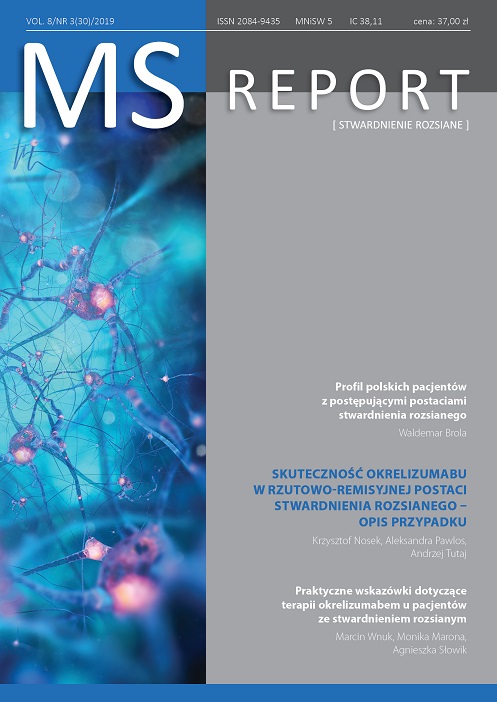Practical aspects of treatment with ocrelizumab in patients with multiple sclerosis Review article
Main Article Content
Abstract
Ocrelizumab is a registered drug for the treatment of adult patients with active relapsing and early primary progressive multiple sclerosis. This article presents a proposal for a treatment protocol for ocrelizumab based on the current summary of product characteristics, the recommendations of German experts (Krankheitsbezogenen Kompetenznetz Multiple Sklerose) and the authors’ own experience. The protocol consists of three parts. The first of them discusses issues analyzed before treatment onset – indications for therapy, contraindications, planned laboratory and imaging tests, termination of vaccinations, pregnancy and breastfeeding, and change from previous disease modifying therapy to ocrelizumab. Then, in the second part, the individual stages of drug administration are presented – preparation of the infusion room, consideration of temporary withdrawal of antihypertensive drugs, exclusion of infection, premedication, infusion of ocrelizumab and monitoring during the infusion. Finally, the third part deals with therapy monitoring and other issues such as hypogammaglobulinemia, vaccinations, cancer screening, new clinical and/or radiological symptoms during treatment, and the duration of therapy.
Article Details
Copyright © by Medical Education. All rights reserved.
References
2. Klein C, Lammens A, Schafer W et al. Epitope interactions of monoclonal antibodies targeting CD20 and their relationship to functional properties. MAbs 2013; 5: 22-33.
3. Genain CP, Cannella B, Hauser SL et al. Identification of autoantibodies associated with myelin damage in multiple sclerosis. Nat Med 1999; 5: 170-175.
4. Li R, Rezk A, Miyazaki Y et al. Proinflammatory GM-CSF-producing B cells in multiple sclerosis and B cell depletion therapy. Sci Transl Med 2015; 7: 310ra166.
5. Serafini B, Rosicarelli B, Magliozzi R et al. Detection of ectopic B-cell follicles with germinal centers in the meninges of patients with secondary progressive multiple sclerosis. Brain Pathol 2004; 14: 164-174.
6. Howell OW, Reeves CA, Nicholas R et al. Meningeal inflammation is widespread and linked to cortical pathology in multiple sclerosis. Brain 2011; 134: 2755-2771.
7. Claes N, Fraussen J, Stinissen P et al. B Cells Are Multifunctional Players in Multiple Sclerosis Pathogenesis: Insights from Therapeutic Interventions. Front Immunol 2015; 6: 642.
8. Hauser SL, Bar-Or A, Comi G et al. Ocrelizumab versus Interferon Beta-1a in Relapsing Multiple Sclerosis. N Engl J Med 2017; 376: 221-234.
9. Mulero P, Midaglia L, Montalban X. Ocrelizumab: a new milestone in multiple sclerosis therapy. Ther Adv Neurol Disord 2018; 11: 1756286418773025.
10. Montalban X, Hauser SL, Kappos L et al. Ocrelizumab versus Placebo in Primary Progressive Multiple Sclerosis. N Engl J Med 2017; 376: 209-220.
11. Krankheitsbezogenen Kompetenznetz Multiple Sklerose. Qualitatshandbuch MS / NMOSD. Praktische Aspekte der Therapie mit Ocrelizumab. Stand: Juli 2018.
12. Gingele S, Jacobus TL, Konen FF et al. Ocrelizumab Depletes CD20+ T Cells in Multiple Sclerosis Patients. Cells 2018; 8: E12.
13. Epstein DJ, Dunn J, Deresinski S. Infectious Complications of Multiple Sclerosis Therapies: Implications for Screening, Prophylaxis, and Management. Open Forum Infect Dis 2018; 5: ofy174.
14. Tsutsumi Y, Ogasawara R, Kamihara Y et al. Rituximab administration and reactivation of HBV. Hepat Res Treat 2010; 2010: 182067.
15. Pourcher V, Todesco E, Dubois C et al. False hepatitis B and C viral serologies in patients with multiple sclerosis receiving high-dose biotin. Mult Scler 2018; 1352458518818294.
16. Klotz L, Havla J, Schwab N et al. Risks and risk management in modern multiple sclerosis immunotherapeutic treatment. Ther Adv Neurol Dis 2019; 12: 1756286419836571.
17. Ocrelizumabinfo.global.
18. Montalban X, Gold R, Thompson AJ et al. ECTRIMS/EAN guideline on the pharmacological treatment of people with multiple sclerosis. Eur J Neurol 2018; 25: 215-237.
19. Wattjes MP, Rovira A, Miller D et al. Evidence-based guidelines: MAGNIMS consensus guidelines on the use of MRI in multiple sclerosis – estsablishing disease prognosis and monitoring patients. Nat Rev Neurol 2015; 11: 597-606.
20. Lebrun C, Vukusic S, French Group for Recommendations in Multiple Sclerosis (France4MS) and the Societe Francophone de la Sclerose En Plaques (SFSEP). Immunization and multiple sclerosis: Recommendations from French multiple sclerosis socjety. Mult Scler Relat Disord 2019; 31: 173-188.
21. Mayer L, Kappos L, Racke MK et al. Ocrelizumab infusion experience in patients with relapsing and primary progressive multiple sclerosis: Results from the phase 3 randomized OPERA I, OPERA II, and ORATORIO studies. Mult Scler Relat Disord 2019; 30: 236-243.
22. Hauser SL, Kappos L, Montalban X et al. Safety of Ocrelizumab in Multiple Sclerosis: Updated Analysis in Patients With Relapsing and Primary Progressive Multiple Sclerosis. Poster nr 648 prezentowany podczas 35. Kongresu ECTRIMS w Sztokholmie we wrześniu 2019 r.
23. Selmaj K. Wykład na temat „Long Term Adverse Effects” w sesji „Risk Management of anti-CD20 therapies” podczas 27. Dorocznego Spotkania Europejskiej Fundacji Charcot w Baveno w listopadzie 2019 r.
24. Cohen BA. Late-onset neutropenia following ocrelizumab therapy for multiple sclerosis. Neurology 2019; 92: 435-436.

